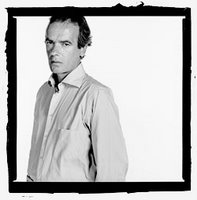
But we mustn't go too far back, must we, we mustn't go too far back in anybody's life. Particularly when they're poor. Because if we do, if we go too far back--and this would be a journey made in a terrible bus, with terrible smells and terrible noises, with terrible waits and terrible jolts, a journey made in terrible weather for terrible reasons and for terrible purposes, in terrible cold or terrible heat, with terrible stops for terrible snacks, down terrible roads to a terrible room--then nobody is to blame for anything and nothing matters, and everything is allowed.Last night I had the distinct pleasure of meeting and hearing one of my favorite writers, Martin Amis, as he read at the 92nd Y here in NYC. Amis read from his new novel House of Meetings, along with the American author Norman Rush, who read from a work in progress.
- from London Fields by Martin Amis
During a Q&A session, he and Rush spoke at length about writers' reaction to 9/11. In his most recent novel Mortals, Rush uses the term "Hellmouth" to describe the feeling we sometimes have these days that earth might just open up before us at any given time. He and Amis spoke about the visceral desire writers have had since 9/11 both to depict and not to depict terrorism and Hellmouth. Both agreed that that John Updike's recent novel The Terrorist failed (though perhaps by both, I mean Rush and James Wood, the host, since I can't remember for certain whether Amis was dismissive), and Amis suggested that adequate time needs to unfold so that such events can steep in a writer's unconscious, before he or she can write convincingly about it.
Some of Amis's recent books have been savaged by the critics (perhaps most infamously by Tibor Fischer), but the Times' Michiko Kakutani give this one a rave review. Some of the criticism of Amis is, I think, legit (Yellow Dog truly did seem like a Amis parodying Amis at times), but I think Amis also often angers people because he is what a true critic and satirist should be: incisive without (automatically) taking sides. And, if you'll allow me to lapse somewhat pathetically into the clichéd cry of the ardent and exasperated fan: Folks just don't get him; he's just too smart and too unflinching for many readers. He's not afraid of approaching sacred cows; neither is he afraid of tipping them.
To that end, Amis ended the Q&A with a quote from his friend Christopher Hitchens, which drew loud applause here in NYC, but would no doubt draw gasps from mosques and churches all around the world:
What can be asserted without evidence, can also be dismissed without evidence.Amen, brother.
For further reading, some pieces by Amis on 9/11:
Amis's essay, Fear and loathing, written immedaitely after 9/11.
The Real Conspiracy Behind 9/11 - review of The Looming Tower by Lawrence Wright
The Age of Horrorism - three-part essay on the fifth anniversary of 9/11
Deranging Consequences of 9/11 - review of Bob Woodward's State of Denial
"The Last Days of Muhammad Atta" - excerpt from a short story by Amis, which also appeared in the New Yorker - see the comments for some great examples of Amis hating.
No comments:
Post a Comment